|
The
following observations represent my opinions. While I believe that the opinions expressed here are consistent with c.
212 § 3, I submit all to the ultimate judgment of the Catholic Church.
The letter “c.” stands for “canon” of the 1983 Code of Canon Law. All
translations are mine, even if they coincide at times with those of others. Dr. Edward N. Peters
Note: If you have
subscribed to Canon Law Blog but do not receive timely notices of
updates, we might have a bad email address for you. With each notice,
a few emails are returned to us, and we have, of course, no way of
letting those subscribers know there is problem.
|
|
In the Light of the Law:
a
canon lawyer's
blog on current issues
Blog
Archives 2002
|
|
The
Baltimore Verdict
|
17
December 2002 |
|
To
no one’s great surprise, the man who admitted shooting a priest three
times in broad daylight was found Not Guilty by a Baltimore jury that
believed he was, at the time of what prosecutors argued was plainly attempted murder, suffering from a
“dissociative disorder”, itself the result of the man's being (and
no one
seriously doubts this) sexually abused by the priest a decade ago. My
criticism is not so much of the verdict (however much it reinforces the
quip that the innocent want a trial by judge while the guilty go for a jury)
for clearly, the trauma of childhood sexual abuse can result in a legion
of psychological and emotional disorders perduring for years. The
greater problems, as I see it, are the reactions to that verdict.
First,
the exonerated shooter is quoted as saying that he hopes the verdict
will send a message of hope to other victims of clergy sexual abuse.
Well, if I may ask, just what message of hope could that be? That
they too might suffer from dissociative disorders and might as a result
find themselves shooting priests in the street? Presumably, that is all
the verdict said about the man’s actions in this case, and that
does not sound very “hopeful” to me. If the man sees more
than that in the verdict, it makes one wonder just how sincerely his
insanity defense was offered in the first place.
|
|
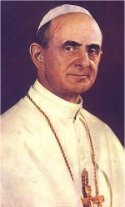
Pope
Paul VI
Si
vis pacem,
cole iustitiam.
|
Second,
Baltimore’s William Cardinal Keeler, (who, in full view of the jury,
stopped to shake hands and exchange cordialities with the priest's assailant on his way to the witness stand)
says he hopes that the verdict
brings a measure of peace to the community. But didn’t Pope Paul VI
teach us that peace is the fruit of justice? If so, the highly dubious
quality of the scant justice wrought in this case leaves little basis for
the Cardinal’s hopes.
For
decades, many Catholic priests inflicted grave injustices on children, and
many Catholic bishops responded, if at all, wholly inadequately to those
crimes. During most of that time, civil authorities looked the other way,
too. In other words, the two greatest social institutions, the Church and
the State, grievously withheld basic justice from young victims. We should
not be surprised, then, that we, like other societies abandoning the rule
of law, now see, quite literally, violent consequences in our streets.
Nevertheless,
those who tell us that the Baltimore
verdict is the dawn of hope for victims and a harbinger of peace for the
community are false prophets. Instead, I suggest the Baltimore verdict is a tragic
endorsement of a savage response to a despicable crime.+++
|
|
|
Friendly
Fire
|
15
December 2002 |
|
According
to a Dec 15 article
by Marion Lloyd in the Boston Globe:
|
|
Sometimes
people on the same side of an issue say things that they think
are helpful to their friends, but in reality this "friendly
fire" might harm the efforts of their allies. I believe
this might have happened in the present case.
|
|
Catholic
officials [in Mexico] voiced sympathy for [Bernard Cardinal Law]
the disgraced Boston prelate. ''This should not be taken as an
admission of guilt,'' Bishop Abelardo Alvarado Alcantara,
secretary general of the Conference of Mexican Bishops, said
Friday. ''Due to the enormous pressure from dissident groups,
including priests, he generously decided to do what he felt was
his duty ... in the best interest of his diocese.''
|
A
resignation is not an admission of guilt per se, but neither is
it a ringing reiteration of one's defense. Cardinal
Law's resignation should have been firmly presented and accepted
months ago because it was fundamentally the right thing to do.
Instead, the delay gave some dissident voices the
opportunity to pile on the beleaguered prelate (whom they
opposed for, shall we say, less noble reasons) and left the
impression that his announcement was a capitulation to pressure,
instead of an action justified in itself.
|
|
Alcantara
said he thought Law had been unfairly judged for his past
actions by the stricter standards of responsibility that have
emerged as the result of the priest sex scandal.
|
I
must question the implication that canonical norms against
clerical sexual misconduct have significantly changed here or
that the obligation of bishops to protect their flocks from
clerical sexual predators is something new in canon law. But
the point is, however, irrelevant because what "brought down"
the Cardinal are not actions from decades ago, but decisions
made by him in just the last few years.
|
|
''It's
as if we wanted to judge crimes today that at the time weren't
considered serious,'' Alcantara said. ''The bishop can't be
expected to denounce a priest and hand him over to a civil
judge. It's like when a father knows his son is guilty, he tries
to protect him and help him correct the mistake. It's a
different mentality.''
|
I
repeat, clerical sexual abuse of minors has always been grave
violation of ecclesiastical discipline, and bishops have always
known it. As for the analogy that suggests fathers ought
to hide their criminal sons from the law,
well, maybe it is a different mentality after all, but
certainly it's one that loving fathers may responsibly reject.+++
|
|
|
The Manchester
Agreement
|
11 December
2002 |
|
WASHINGTON
(December 10, 2002) -- Belleville Bishop Wilton D. Gregory,
President of the United States Conference of Catholic Bishops,
issued the following Statement concerning the
Agreement
announced today between the Diocese of Manchester and the Office
of the Attorney General of the State of New Hampshire:
|
|
One
cannot but feel sympathy for Bishop Wilton Gregory,
President of USCCB, upon whose watch four decades of clerical
sexual misconduct have come home to roost. I realize that in his
position, he (no more than anyone else would have been), is not
entirely his own man, and I have on several occasions praised his
earlier statements on this burgeoning crisis. But now, after
reading the statement issued under his name on the Manchester
agreement, I feel it is time for some criticism.
|
|
The
Diocese of Manchester has reached a legally binding mutual
agreement with the office of the Attorney General of New
Hampshire which involves acknowledgment by the Diocese that the
State has evidence likely to sustain a criminal conviction
against the Diocese for a failure in its duty to care for young
people.
|
The
enormity of the admission in Paragraph 1 (a Catholic
diocese admitted engaging in criminal conduct) calls for, before
anything else, an immediate
and profound expression of renewed sorrow. There is none. |
|
I
understand the pressures under which the Diocese acted, and I
note that this resolution is specific to the facts in the
Diocese of Manchester and to the laws of the State of New
Hampshire. It does not in any way indicate agreement on the part
of any other diocese or of the United States Conference of
Catholic Bishops in the legal analysis on which the Office of
the Attorney General of New Hampshire has acted.
|
Is
Bp. Gregory suggesting that the “pressure under which the
Diocese acted” should temper our reading of its admission?
Does the Diocese admit to criminal activity, or not? If so, was
its admission free, or not? If it was free, what matters whether
pressures deriving from diocesan criminal misconduct were
present? And why protest that the Manchester agreement in no way
reflects the opinions of other dioceses or the USCCB? What
question is being raised here?
|
|
However,
there are elements in the agreement which parallel the bishops'
own decisions last June which are embodied in the "Charter
for the Protection of Children and Young People."
|
This
statement actually means so little, that it cannot be commented
upon. |
|
In
particular, the idea that an audit function would be helpful in
resolving this terrible problem permanently was adopted with the
creation of the Office of Child and Youth Protection. With its
director, Kathleen McChesney, in place, every diocese will now
benefit by an audit of their efforts to keep children safe.
|
Phrases
like “audit function” reinforce the pervasively bureaucratic
appearance of the bishops’ response to what is fundamentally,
at every level, a moral crisis. The cold phrase “audit
function” rings in most ears as dealing with financial
concerns. It is incumbent on authors to explain their
idiosyncratic usage of terms common from other fields.
|
| We
did this because, as bishops individually and collectively have
acknowledged, there were mistakes and failures in our handling
of cases of abuse of minors by clergy. |
Bp.
Gregory speaks of “mistakes
and failings.” Just “mistakes and failings”? How about “sins”,
or even “crimes”? Isn’t that what the
Manchester agreement concedes? One doesn’t face
prosecution for “mistakes”, one faces it for crimes.
Avoidance of that stark term fools no one. Of course, if the
Diocese does not feel it engaged in criminal activity, it should
say so. But if the Diocese concludes that its activities were
criminal, others have little basis to doubt that admission.
|
| They
were serious ones, but they are not attributable to
intentionally bad acts but, most often, to a lack of awareness
of the extent to which this behavior entails a deep sickness
which is resistant to treatment. |
Does
Bp. Gregory think the only crimes for which one should be
prosecuted are “intentional” crimes? No one I know is
suggesting that bishops routinely assigned sexual miscreants
with the intention that they would abuse minors, rather, the
claim is that some bishops were criminally negligent in
their toleration of these men in church work. As for whether the
misconduct was a result of a “deep sickness”, well, I think
we can agree, some were. But were all of them so? What
do we think about those cases? By the way, could not this same
“deep sickness” defense be used to defend, say, a drunk
driver who goes out and kills people, albeit unintentionally? I
ask, so
what?
|
| The
errors of specific persons, at specific times and places which
may have endangered children, cannot be attributed to the
"Church" as a whole without overlooking the lives of integrity
and good works of ministers of the Church in our country
throughout its history. |
"May"
have endangered children? May? This paragraph plainly
tries to paint a very narrow picture (“specific persons, at
specific times and places”) of a very
broad, even systemic, problem. It’s yet another attempt at
bureaucratic minimalization. No one honestly doubts but that
thousands of fine Catholic priests have been at work over the
last 40 years. That does not excuse the episcopal
toleration of hundreds of sexual offenders in clerical
ranks for decades. To try to avoid saying that, and saying it
plainly, is but to fan the flames of cover-up suspicion already
raging out of control. It certainly does not ring as true as did
Bp. Gregory’s fine statements this past summer.
|
| There
is a difference between mistakes and intentional wrong
doing. |
Never
talk down to readers. This crisis is not about mere
"mistakes". And we are not talking (at least in regard
to most bishops, a distinction Bp. Gregory himself admits
later) about intentional episcopal wrong-doing. We are talking
about the huge middle possibility of culpably negligent
episcopal behavior. That is what people want to hear bishops, where
appropriate, admit to frankly and without bureaucratic
dissimulation or word-mincing.
|
|
As
Church leaders, we are willing to own up to our mistakes.
However, except for those very few who personally have also been
perpetrators, church leaders have not intentionally endangered
the welfare of children.
|
M.O.S. |
| We
will always repent of the mistakes that resulted in abusers
being kept on in ministry to hurt and abuse more children. We
give our full support to means, such the Office of Child and
Youth Protection, which will help us prevent abuse in the
future. |
One
does not “repent” of “mistakes”. One learns from them.
One repents from sins. Bishops should be
unequivocally holding themselves to that standard, and they
should be calling the rest of us to repent of ours. Also, among
the welcomed “means” for preventing child abuse in the
future, does Bp. Gregory include agreements like Machester's, or
not? I hadn’t thought it was a question till I read this
statement. Now, I’m not sure.+++
|
|
|
|
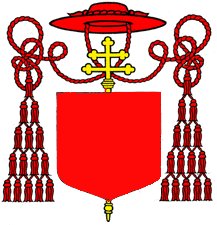
Standard
Cardinal Coat of Arms
|
Cardinal
archbishops, like all ecclesiastical office holders, may resign their sees
for any just cause (c. 187). The reasons that suggest the appropriateness
of a pastor resigning his parish (cc. 1740-1741) would, mutatis
mutandis, be relevant to the case of an archbishop considering
resigning his see.
If a cardinal resigns his pastoral or curial office (indeed
all are requested to do at age 75 anyway, cc. 354 & 401) he does not
thereby lose the power of voting in a papal conclave.
That, he retains until age 80, at which point his right to vote
automatically lapses.
There is no mechanism for forcing a given cardinal to attend
a papal conclave, however, and Church law expressly allows a
conclave to proceed despite the absence of one or more cardinal
electors, though in such circumstances, it is expected that a
cardinal who declines to attend, presumably for grave reasons,
will so inform the conclave. |
|
|
|
On Dec.
3, 2002, Joseph Cardinal Ratzinger made the following comments
at a conference in Spain: “In the Church, priests also are
sinners. But I am personally convinced that the constant
presence in the press of the sins of Catholic priests,
especially in the United States, is a planned campaign, as the
percentage of these offenses among priests is not higher than in
other categories, and perhaps it is even lower. In
the United States, there is constant news on this topic, but
less than 1% of priests are guilty of acts of this type. The
constant presence of these news items does not correspond to the
objectivity of the information nor to the statistical
objectivity of the facts. Therefore, one comes to the conclusion
that it is intentional, manipulated, that there is a desire to
discredit the Church. It is a logical and well-founded
conclusion.” Source: Zenit
ZE02120324. |

"Maria
Monk" |
I
agree with the Cardinal. I would simply add, though, as one who has
watched, and tried to fight, anti-Catholicism in the US media throughout
my adult life, that even the most outrageous accusations of the infamous
Maria Monk canard pale against the real life deeds of scores, if not
hundreds, of our priests, frequently with the knowledge of, or at least
the culpably negligent ignorance by, our bishops. Anti-Catholics in the US
media have no need for lies when the truth condemns. Yes, our enemies
rejoice over us. But it is we who have betrayed the City into
their hands. God surely sees the hearts of those who hate the Church and
delight in its suffering. But, in the meantime, each of us has contributed
to this debacle by our own sins, and, just as surely, we must each
contribute to the Church’s recovery by our own acts of personal
repentance. +++
|
|
|
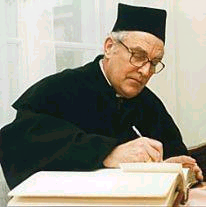
Zenon
Cardinal Grocholewski, one of the Vatican's most respected canon
lawyers,
directs the Congregation for Education.
|
The
Congregation for Education, the Vatican dicastery that accredits pontifical
faculties around the world, announced November 19 in its decree Novo
Codice, that it will henceforth require a
third year of full-time canonical studies for the degree of licentiate in canon law
(J.C.L.). The Congregation also
reiterated its expectation that all canonists, notwithstanding the wide
availability of basically reliable canonical translations, still be able to read
Latin, the official language of canon law. Moreover, the practice of
waiving First-Cycle theology requirements for civil lawyers (a practice I am
pleased to note was not adopted by my alma mater) has not only been
prohibited, but an additional year of theological study will now be required of all
incoming JCL students not already possessing a Masters in theology. All of these changes are
steps in the right direction. They are, I suggest, more evidence that canon law
continues its re-emergence from the cloud of antinomianism under which it has
labored since the Second Vatican Council.
|
Considering
only, for example, how much of the recent clergy scandals in the USA can be
traced to ignorance of, or disregard for, canonical directives in Church life,
it's good to see Rome taking positive steps to augment the expertise of those
who will be increasingly called upon to advise bishops and others on the
juridical aspects of ecclesiastical ministries and apostolates. But these are
only steps and more remains to be done to increase the vital professionalism of
modern canon law. I’ll be addressing those points in due course.+++
The
revised norms for handling allegations of clerical sexual misconduct are out,
and while, strictly speaking, they still require approval from the USCCB and,
once more even, from Rome itself, there is little doubt but that both
ratifications will be secured promptly. Predictably,
some are presenting the revised norms as virtual
endorsements of the USCCB’s summer proposals, while some, conceivably, would
like to cast the new norms as a trouncing of the bishops efforts. As usual,
neither extreme interpretation is accurate.
As I
had hoped, the bishops’ excellent Preamble remained virtually intact.
Deftly, however, Rome chose the Preamble to insert a badly needed
clarification as to what legally constituted the sexual abuse of minors (i.e.,
“an external, objectively grave violation of the Sixth Commandment”), thus
remedying one the weakest parts of the bishops’ summer efforts.
The
bishops’ call for all dioceses to file policies on sexual misconduct with the
USCCB has been retained, but the revised norms now explicitly demand that such
policies honor the requirements of procedural canon law (e.g., Canons
1717-1719).
The
bishops’ plans to have outside boards conduct the canonically mandated
investigations of clergy sexual abuse allegations has been rejected by Rome;
such boards now merely advise bishops on what was, all along, their
responsibility. Rome has also insisted that all the members of this board be
Catholic (pace the USCCB’s press release on this point) albeit persons
financially independent of the Church. In both respects these are major
improvements over the original proposals.
The
so-called “appellate review boards” are completely gone, saving the Church
and the people she serves the confusion of a whole parallel system of
institutions for dealing with just one kind of case. And the earlier skimpy
outline of investigation procedures has been considerably beefed up by express
references to various relevant canons that, all along, have been in force,
waiting to be applied. Importantly, Rome has reiterated the rights of the
accused not to be subjected to involuntary psychological investigation, I hope
once and for all.
Both
versions of the norms recognize that for even a single act of child sexual abuse
an offending cleric will be removed permanently from ministry. Amen to that,
especially now that the working definition of child sexual abuse is much less
subjective than was earlier envisioned.
Two
new and important provisions inserted by Rome remind bishops that 1) they
already have what canonists call “executive power of governance” enabling
them to deal promptly with potential abuse situations not immediately addressed
by criminal canon law, and 2) that bishops can request from Rome, even without
the cooperation or consent of the cleric in question, what is termed an ex
officio dismissal from the clerical state for offensive behavior. It is, I
suggest, another quiet affirmation that canon law was not lacking as this crisis
mounted, it more often was simply not being applied.
We can
leave to others the interesting, if largely irrelevant, question as to the
degree to which the revised norms should be seen as endorsing the bishops’
original proposals from this summer. One’s time is better spent, I suggest, in
identifying any possible remaining weaknesses in the policies (there are some, I
think), and then getting about the task of protecting children from sexual
predators among the clergy. +++
|
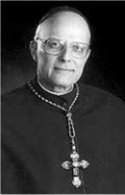
Francis
Cdl. George
Chicago,
IL
|
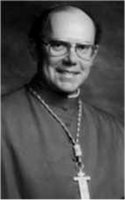
Abp.
William Levada
San
Francisco, CA
|

Bp.
Thomas Doran
Rockford,
IL
|
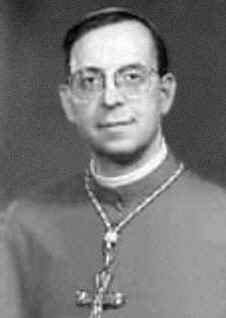
Bp.
William Lori
Bridgeport,
CN
|
The four
American prelates who worked with Roman officials to obtain a significantly
improved
procedure for dealing with the crisis of clergy sexual misconduct with children.
|
The
authority of the Roman Pontiff to establish new mysteries in the Marian
Rosary is certain (c. 331). As a result of Pope John Paul II issuing his
apostolic letter Rosarium
Virginis Mariae,
the canonical directive to pray the rosary given to seminarians in Canon
246 § 3 and to those living the consecrated life in Canon 663 § 4 will
now be observed by praying a rosary consisting of fours set of
mysteries, instead of the traditional three.
For
the rest of us, likewise, when we pray the rosary as an authentic
devotion (see cc. 214, 839, & 1186) we will do so in light on the
pope’s call to expand our meditation as outlined in Rosarium.
|
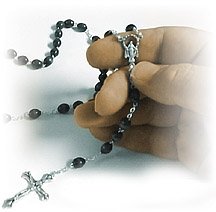 |
There is, of course, no canonical obligation on us to pray the rosary at
all, and for those who do so, the days suggested for praying specific
mysteries are, strictly speaking, just that, suggestions. Other manners
of praying (e.g., a decade a day, chosen in a way consistent with the
liturgical season) are acceptable. Finally, the revised format of the
Rosary is unquestionably eligible for indulgenced prayer in accord with Handbook
of Indulgences, Other Grants, No. 48. Sancta Maria, Mater Dei,
ora pro nobis peccatoribus! +++
|
The Vatican is about to reject, at
least in substantial part, the USCCB’s novel proposals for dealing with the
clerical sexual abuse of minors crisis. This is good news.
Except for its Preamble (which reads quite well, I think), almost the
whole of the rest of the June 14th document was problematic. It failed
to define terms, it ignored whole stretches of canonical criminal
procedure, and, though billed as the charter for episcopal
responsibility, it actually removed from bishops considerable authority
for responding to these cases (on the Church’s behalf, no less) and
delivered it to quasi-independent committees, themselves only vaguely
configured.
|
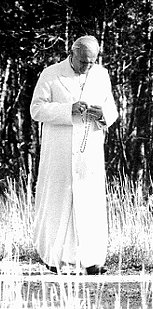
Pope
John Paul II
Man
of Prayer, Man of Law |
Chiefly, though, the Charter never recognized that the canons already on
the books of the 1983 Code of Canon Law will, if applied responsibly, go
a long, long way toward punishing wrong-doers, aiding victims, and
preventing future abuse from occurring. The problem has not been the
law. The problem all along, I suggest, has been too many bishops’
failure to apply canon law diligently. I see in the Vatican’s
rejection of this proposed charter a clear directive to apply the canons
now in force, and to the degree they might need reforming (canon law,
like the Church, always needs some reforming), Rome will, as it has in
the past, consider reasonable proposals.
Pope John Paul II is starting his 25th year in the Chair of Peter with a
bang: a beautiful document updating the laity’s chief Marian devotion
on one hand, and a firm reassertion of the measured application of
disciplinary law on the other. Pro papa nostro, agimus Tibi gratias,
Domine! +++ |
Update:
(18 October): "When it comes to beating the Catholic Church", said G.
K. Chesterton, "any stick will do." It's already started:
Hostile critics are charging the Vatican with everything from stupid
curial blindness, to clerical wagon-circling, to an out-and-out
cover-up, based on its rejection, for the most part, of the USCCB's
proposed norms on clerical sexual misconduct. In reality, though, the
Vatican wants bishops, not vaguely described committees, to take real responsibility
for supervising Catholic clergy and allegations of misconduct; it wants
canon law to be applied fairly and vigorously against such dangers, and
will not countenance resort to ill-defined policies thrown together
under media spot lights; and it even dares to suggest that in the flood
of verified allegations of disgusting clerical misconduct, there are at
least a few innocent priests (and others) who are being railroaded by
the same disrespect for fundamental legal procedures that helped get us
into this horrible mess in the first place.
A considerable number of the men who actually created this crisis, whether
they be priests who engaged in gravely illicit behavior, bishops who did
not recognize or did not act on that information, or some advisors who
helped shape an attitude of neglect, are now gone from the scene,
leaving others behind to clean up their mess. The lack of
credibility that current committed Catholic leadership has on this topic
is the price it has to pay for other's mistakes. So be it. Time and
again the Church has experienced the pain of having wandered from its
own published principles and the solution was rarely found in the
concoction of new structures, committees, position papers, charters, and
what have you, but rather the humble return to the perennial principles
of sound moral, pastoral, and canonical wisdom.+++
Pro-Life Bishops vs.
Pro-Abortion Politicians, 4 October 2004
The US
bishops are planning a statement on the upcoming 30th anniversary of Roe v. Wade,
i.e., the infamous case legalizing abortion in America. Since Black Monday,
America's bishops have been unwavering in expressing their opposition to
abortion. But if some of them feel it's perhaps time to go beyond words (yes, I
know, some bishops have made sacrifices for life, efforts perhaps known but to
themselves and God), at least two public canonical responses seem immediately
worth considering.
|
1) Catholic politicians who
support abortionism involve themselves in objective manifest grave
sin (Evangelium vitae, 73). Such persons, to the extent
that they persist in these misdeeds, make themselves ineligible for admission to
Communion (c. 915). Diocesan bishops have the right and duty to see to the
spiritual welfare of all those in their care (c. 383), of maintaining Catholic
discipline on faith and morals (c. 392 § 1), and of preserving the Eucharist
from unworthy reception (c. 392 § 2). The application of Canon 915 does not
require a penal process, and therefore a bishop is free to shape his own
approach to individual circumstances. I already wrote an extended
canonical study of an actual case wherein a bishop applied Canon 915 against
a pro-abortion politician, so I won't repeat those matters here. The point to take
from this is that the norm is on the books, ready to be used.
2) Canon law makes it a crime for Catholics to use "…public
speeches, published writings, or other instruments of social communication to…gravely
injure good morals…" (c. 1369). I think many of the activities of
pro-abortion Catholic politicians, even in the act of casting their votes for
death, to say nothing of the variety of public affairs that politicians
typically engage in, meet exactly the requirements of this canon, which visits
upon its violators a "just penalty". While this canon is expressly a
penal canon, demanding therefore the observance of penal procedural law (e.g.,
cc. 1341-1353), the flexible, indeterminate penalty makes Canon 1369 especially
worth considering by bishops concerned to address the harm being caused by
pro-abortion Catholics in politics. Moreover, contempt for what would likely be
lesser penalties to start with can result in escalation of penalties against the
recalcitrant (cc. 1393 & 1399). This canon too I have discussed in a recent interview.
As with Canon 915, the law is already in effect. What's required is the will to
use it. +++ |

It's
a mortal sin to tell
people
that
they may kill a pre-born child.
|
|
Some
weeks ago, a small but thoughtful group of US bishops proposed convoking what
would be the "Fourth Plenary Council in America" in order to deal with
the crisis of clerical sexual misconduct. Since then the list of supporters of
the idea has slowly grown. A plenary council is, of course, a serious thing. It
has genuine legislative authority (c. 445), a power that is not widely
distributed in the Church (c. 135). An examination of the canons on plenary
councils (cc. 439-446), however, raises some questions that need to be addressed
before moving forward. In brief, the problem is not the council, it's
the conference.
Specifically, the United Stated Conference of
Catholic Bishops (the recently reorganized USCCB) would have almost complete
agenda-making and conduct-governing authority over a national plenary council (c. 441). But
this is the same conference on whose watch the clergy misconduct crisis has
festered for years. Its efforts to address priestly misconduct (and there have
been some efforts, to be sure) have not generally been such as to inspire
confidence among the faithful yet.
|
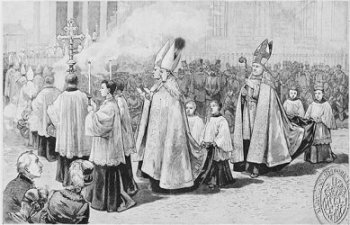
The
last Plenary Council for the United States met
in Baltimore,
Maryland, in 1884. |
One might counter that, at least in part, some
of the bishops who made up the conference in years past (when little was being
done nationally to check priestly misbehavior) have since retired, leaving
relatively more influence to recent appointees. These, there is reason to hope,
seem more willing to confront criminal behavior in the ranks of their priests.
Ah, but this raises a second concern, namely, that the conference is empowered
to invite even retired bishops to a plenary council, which in turn would be
required to give them a deliberative vote (c. 443 § 2). Such an action would
dilute the influence of exactly those newer bishops whose voices most need to be
heard.
A plenary council, if one is held, should limit
its agenda to the topic of clergy sexual misconduct and only active bishops who
have to face the crisis here and now should be invited with a deliberative vote.
Finally, the Holy See needs to communicate that it is truly ready and willing to
reject any legislation that might be inconsistent with genuine Catholic
character (c. 446). +++
Update,
November 10: The November issue of Catholic World Report,
pp. 32-33, features opinions from several prominent US Catholic observers on
the advisability of convoking a Plenary Council for America.
If all
things were equal—and they never are—but if all things were equal, I would
prefer to see people receive Holy Communion standing. I personally like the
symbolism of those who have been raised to new life in Christ receiving Him
standing, as was done in the early Church. But this “ancient practice” argument
cannot be pressed very far, at least not unless one is also willing to
go back, say, to seven-years-on-bread-and-water penances. The selectivity of
those who argue for the return of some ancient practices while avoiding, if not
vetting, others, borders on the hypocritical.
|
But I
would never dream of withholding, or of countenancing the withholding of, the Eucharist from someone because of their choice to
receive Jesus kneeling. This gesture of reverence for the real and substantial
presence of Our Lord in the Eucharist has as distinguished a pedigree in the
Church as does the erect posture. Besides, among fully-initiated Catholics (c.
842 § 1) who have observed a one-hour fast (c. 919 § 1), only “the excommunicated,
interdicted…or others who obstinately persist in manifest grave sin” are
to be denied the Eucharist (c. 915. See also cc. 213, 843 § 1, & 912). It is
inexcusable to treat devout Catholics who choose to receive Holy Communion on
their knees as if they were suddenly grave sinners.
|
 |
If
nothing else,
the timing of this change is wrong. Instead of removing a traditional sign of
belief in the Eucharist at the very time when most studies show Catholic belief
in that mystery to be at modern lows, we should welcome a reasonable and popular
gesture of faith in the Blessed Sacrament. Finally, if a change in discipline does
come, it would be nice if, for a change, it were not sprung on loyal but
bewildered Catholics who have been encouraged in one practice for years, only to
be chastised for not reading the latest liturgical tea leaves quickly enough to
suit the makers of liturgical morals. The faithful deserve some pastoral
preparation. +++
|
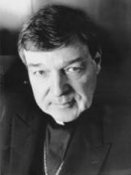
Abp.
George Pell |
Archbishop George Pell of Sydney
Australia should not have surrendered his ecclesiastical authority for
an indeterminate period of time. His gesture of 20 August 2002 in
response to sexual misconduct accusations against him is meant to convey
his willingness to undergo the rigors of investigation and his
confidence about his own vindication. It is obviously well-intentioned.
It has the air of a “class act” undertaken by a true gentleman (not
surprising, considering that is exactly what Archbishop Pell is.)
But it
has no foundation in a canon law system that only recognizes only outright
resignation from episcopal office (c. 401) or, more rarely, a declaration that a
see has been “impeded” (c. 412) by conditions clearly not satisfied under
the present circumstances. As archbishop, moreover, Dr. Pell could not have used
his powers to interfere with various investigations that were being conducted
independently of his office in the first place. His action therefore, already extra
legem (outside the law, but not exactly contrary to it), accomplishes little
concrete in the order of procedures. |
What
it does do, I am afraid, is to establish a dangerous precedent or “unwritten
expectation” for others. If a man as upright and as innocent as (I believe)
Archbishop Pell is will surrender high ecclesiastical office for an extended
period of time on the flimsiest of accusations, what is to prevent every bishop,
not to mention clerics or lay workers, from being held to that same unreasonable
standard, especially given that few accusations are likely to be as obviously
worthless as are those under which Archbishop Pell labors. Will not such
expectations of “temporary resignations” now be demanded by every enemy of
the Church who wants to gum up its administrative and pastoral life? Moreover,
should Archbishop Pell now order, or even allow, one of his own faithful pastors
or lay workers to drop his duties to Christ and His people in response to
accusations that the archbishop himself might be certain are false? If so, at
what point exactly does an investigation into these sorts of accusations end?
This is far from clear, leaving the terminus of such an anomalous situation
helplessly up in the air. If nothing else, these are some of the questions that
need to be addressed before concluding in favor of the archbishop’s action.
+++
Update
1:
It is now October 8th, and the archbishop’s “accuser” is
apparently still refusing to cooperate with a civil investigation of his
allegations, all the while leaving Dr. Pell in a foggy accusational limbo. Let
the investigations continue, but meanwhile the esteemed archbishop should
declare his self-imposed exile over, and resume his praiseworthy leadership of
the Church of Sydney. +++
Update
2:
As of the 15th of October, an independent inquiry being unable to substantiate
any of the accusations made against Abp. Pell, he has resumed his duties. Deo
gratias. +++
Prof.
Rev. Gianfranco Ghirlanda, SJ, distinguished dean of the canon law faculty at
Rome’s influential Gregorian University, is reported to have said recently
“From a canon law perspective, the bishop and the [religious] superior are
neither morally nor judicially responsible for the acts committed by one of
their clergy.” (Assoc. Press, 18 May 2002, article by Tom Rachman).
Perhaps
Professor Ghirlanda was misquoted or his remarks taken out of context.
In any case, the claim that bishops and religious superiors are neither
morally nor judicially responsible for acts of their clergy seems difficult to
reconcile with Canon 128 of the 1983 Code of Canon Law that states: “Whoever unlawfully causes harm to another by a juridical act, or indeed by any other
act
which is deceitful or culpable (actu dolo vel culpa posito), is obliged to repair the damage done. (British
trans.)” The Americans render the operative phrase “with malice or
negligence”. Either way, the canon (one, incidentally, that greatly expands
the scope of ecclesiastical liability for malfeasance in office over its 1917
Code counterpart, Canon 1681) is a clear enunciation of the obligation of
persons in the Church (there being no exemption for bishops in this regard) to
make good harms unlawfully caused as a result of their actions or omissions.
The
pertinent claim is that the some bishops (not all, but at least some) placed
priests known to them to be pederasts or homosexually active in positions
wherein they could and did sexually abuse minors. A man who knows his hound
snaps at children must not allow such an animal to run free through the
neighborhood. If he does so, and if a child is bitten by such a dog, the owner,
I suggest, is morally and juridically liable not for biting children himself,
obviously, but for knowingly allowing a situation to arise wherein children
could predictably be bitten by his dog. The same would seem to apply to bishops
who knowingly assigned to parish ministry priests with a known proclivity to
toward sex with minors.
|
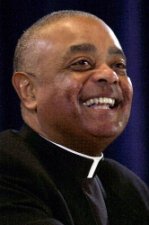
Bp.
Wilton Gregory outlined an approach
to
episcopal responsibility for clerical misconduct cases that was
forthright and balanced. Read his June
13th address. |
If
that analogy limps in some ways (e.g., dogs don’t have free will, but priests
do), consider the case of one man who freely lends his automobile to another
despite knowing that the other is a reckless driver. The owner’s good driving
record is not at issue when the other man causes a tragic accident, but his
prudence in helping to make possible the crash by enabling the reckless man to
have access to a car, is.
Of
course, in these dark days, some wish to impose to a “strict liability”
standard on bishops in all priestly sex abuse cases, holding bishops financially
responsible for harms caused by their priests notwithstanding the bishop’s
lack of knowledge of the danger. This is wrong and unjust. Others, in cases of
some genuine liability on the part of the bishop, wish to exaggerate that
liability out of anger or greed. This is opportunism. Both approaches should be
rejected.
But I
believe it is a mistake to make the blanket claim that there is no canonical
basis for episcopal liability for harms arising from priestly misconduct. There
is a basis for such liability in canon law. Only a fair, case-by-case,
examination of the facts will determine whether such liability is warranted in a
given case, and if so, how much compensation should be awarded. +++
|
Top
|| Home
|| Canon
Law || Liturgy
& Sacraments || Catholic
Issues || Personal
|














